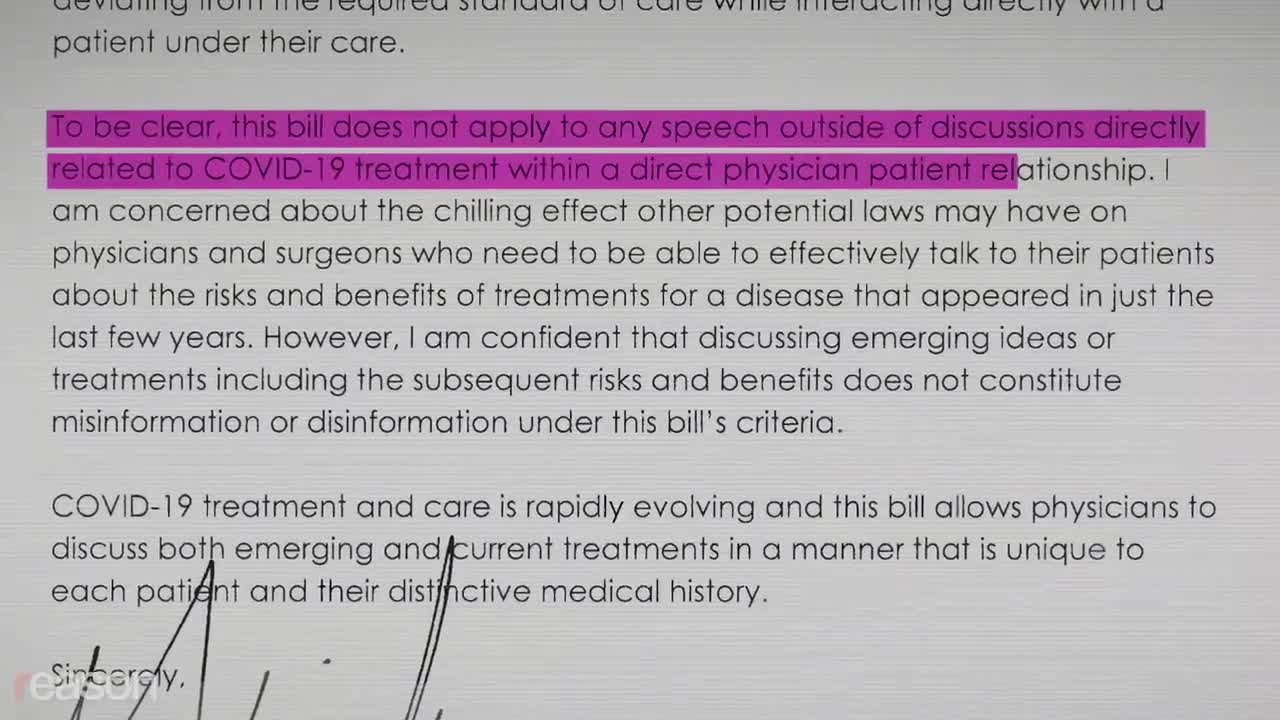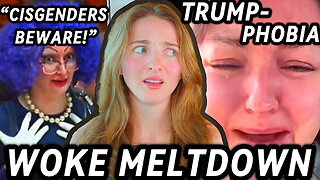Premium Only Content

Viral COVID-19 Vaccines: What They Are, How They Work and Possible Causes of Injuries
A new California law gives the state unprecedented control over what doctors can say to their patients about COVID-19.
"We've got to stop the disinformation pipeline," an emergency physician supporting California's AB 2098 told the California Assembly in April.
Stanford economist and medical school professor Jay Bhattacharya, a leading critic of the law, says that it "puts the [Center for Disease Control] in the same room with the doctor and the patient," violating a basic trust.
Governor Gavin Newsom signed AB 2098 into law in September, meaning that starting in 2023, doctors who disseminate what the state defines as "misinformation or disinformation related to the SARS-CoV-2 coronavirus" can face disciplinary action by the California Medical Board, including being stripped of their licenses.
"It essentially ends your ability to combat bad ideas put out by public health because you have this looming power that over you that essentially can end your career," says Bhattacharya.
"This kind of campaign essentially put the government in the role of suppressing legitimate public policy debate," says Bhattacharya about Fauci and Collin's actions. "The idea was to create this illusion of consensus around the lockdowns that didn't actually exist."
That same illusion of consensus, Bhattacharya says, is what California is leveraging to quash dissent among doctors across the entire state with this new law.
AB 2098 defines COVID-19 "misinformation" as medical advice "contradicted by contemporary scientific consensus," though does not specify how to define such a consensus.
"Regardless of your views on the state of California's coronavirus response policies or their public health policies, I think any person—left, right, liberal, conservative—who goes to their physician and asks them a question about COVID treatment…wants to actually know what their physician thinks," says Aaron Kheriaty, a psychiatrist and former professor who taught bioethics at the University of California, Irvine's medical school. "No one wants a doctor who's just reading from a script that was written by the California Department of Public Health."
"Science and censorship are, in fact, incompatible," says Kheriaty. "[Science] has to be an ongoing, open conversation where debate, where novel perspectives, where challenges to orthodoxy or conventional thinking are not only permitted, but welcomed and then tested against the empirical evidence."
Kheriaty worries that AB 2098 will "lock" whatever the current consensus happened to be into law as "something cannot be challenged." The bill's authors didn't reply to our interview requests, but Democratic Assemblyman Evan Low said this when introducing the bill: "The definition of misinformation is malicious intent. It is very specific, very direct. And it's important that we help the California Medical Board to have these tools and provide an opportunity to save lives."
Bhattacharya points out that medical malpractice laws, which he views as "completely legitimate," already exist to protect patients against malicious or negligent doctors. But he says AB 2098 goes much further by preventing "doctors from dissenting against reigning ideas in public health, even when public health is wrong."
"The effect of the law will be to suppress free discussion by doctors who are afraid of losing their license if they disagree with public health online and elsewhere," says Bhattacharya.
The rationale written into the text of the law is that COVID-19 has "claimed millions of lives worldwide," including tens of thousands in California and that "the safety and efficacy of COVID-19 vaccines have been confirmed through evaluation by the Federal Food and Drug Administration." Kheriaty says this latter claim was "plausible" early on but that the waning efficacy of the vaccine calls for a more nuanced discussion that physicians should be free to have with their individual patients.
"A doctor's recommendation has to be tailored to the needs of this specific patient in front of me," says Kheriaty. "So it's not necessarily the case that a doctor who's recommending the vaccine for an 80-year-old with diabetes would also want to recommend the same vaccine for a six-year-old or a 16-year-old."
"Public health should not rule over the public," says Bhattacharya. "Public health should be partners with the public in promoting health. I think 'humility' would be the watch word in my reform of the public health world."
Produced by Zach Weissmueller; edited by John Osterhoudt; camera by Jim Epstein and Osterhoudt; graphics by Regan Taylor; additional graphics by Lex Villena.
-
 45:39
45:39
Survive History
15 hours ago $8.39 earnedCould You Survive in the Shield Wall at the Battle of Hastings?
58.3K6 -
 1:50:28
1:50:28
TheDozenPodcast
13 hours agoViolence, Abuse, Jail, Reform: Michael Maisey
96.7K4 -
 23:01
23:01
Mrgunsngear
1 day ago $5.62 earnedWolfpack Armory AW15 MK5 AR-15 Review 🇺🇸
83.1K12 -
 25:59
25:59
TampaAerialMedia
1 day ago $3.46 earnedUpdate ANNA MARIA ISLAND 2025
52.5K4 -
 59:31
59:31
Squaring The Circle, A Randall Carlson Podcast
16 hours ago#039: How Politics & War, Art & Science Shape Our World; A Cultural Commentary From Randall Carlson
40.2K3 -
 13:21
13:21
Misha Petrov
15 hours agoThe CRINGIEST Thing I Have Ever Seen…
32.4K57 -
 11:45
11:45
BIG NEM
11 hours agoWe Blind Taste Tested the Best Jollof in Toronto 🇳🇬🇬🇭
23K1 -
 15:40
15:40
Fit'n Fire
15 hours ago $0.50 earnedArsenal SLR106f & LiteRaider AK Handguard from 1791 Industries
19.9K1 -
 8:34
8:34
Mike Rowe
6 days agoWhat You Didn't Hear At Pete's Confirmation Hearing | The Way I Heard It with Mike Rowe
56.4K23 -
 7:13:44
7:13:44
TonYGaMinG
16 hours ago🟢LATEST! KINGDOM COME DELIVERANCE 2 / NEW EMOTES / BLERPS #RumbleGaming
74.8K7